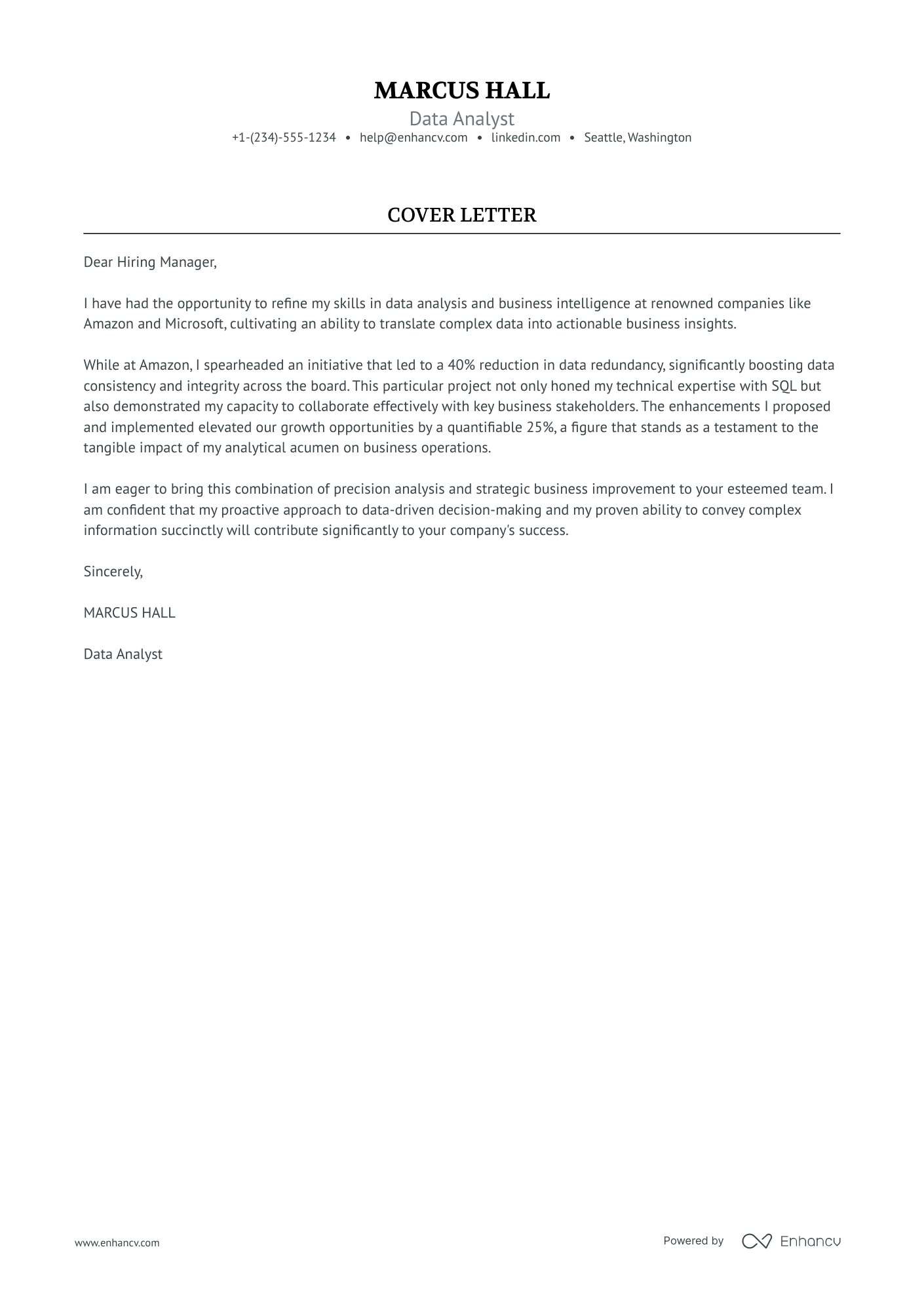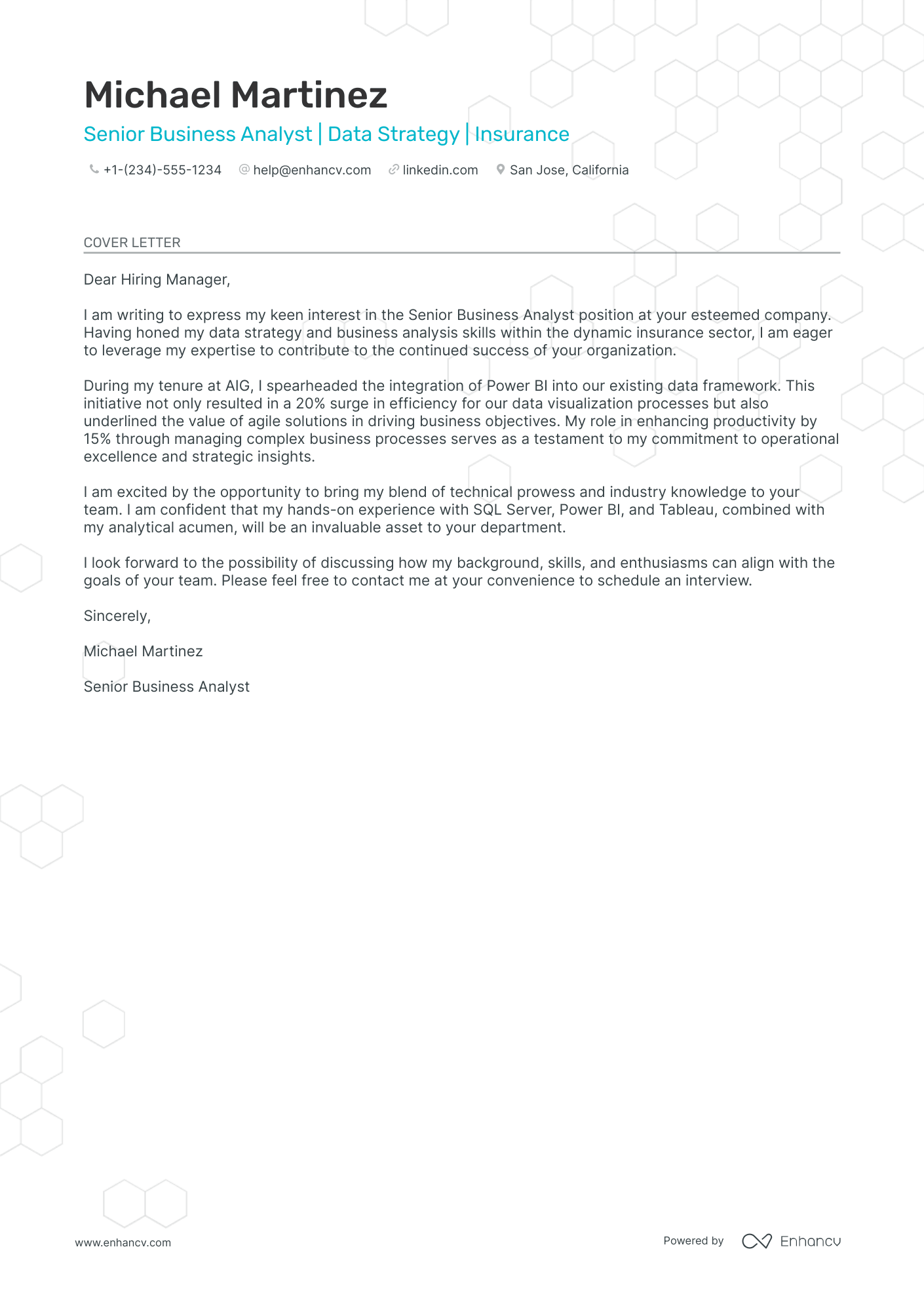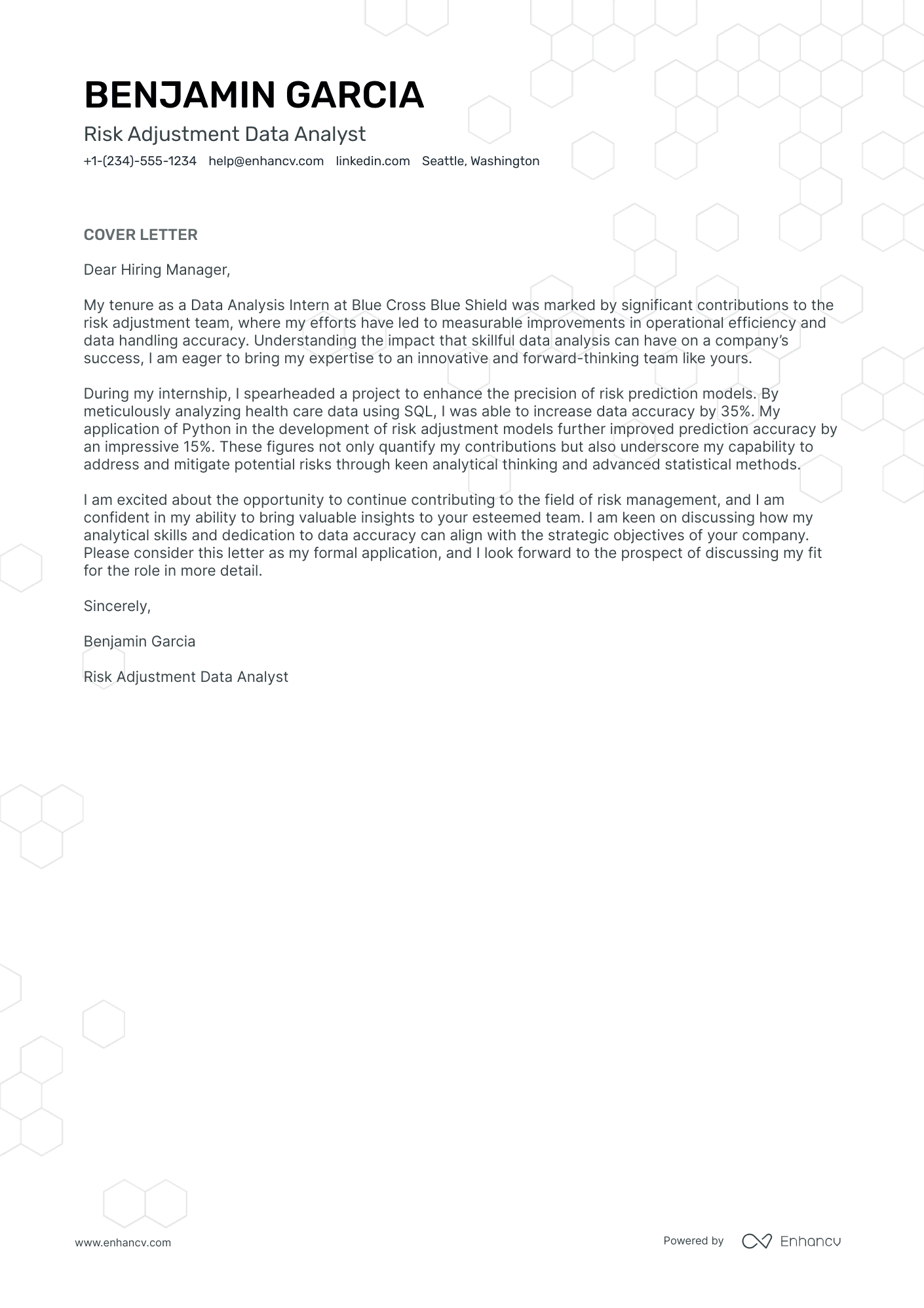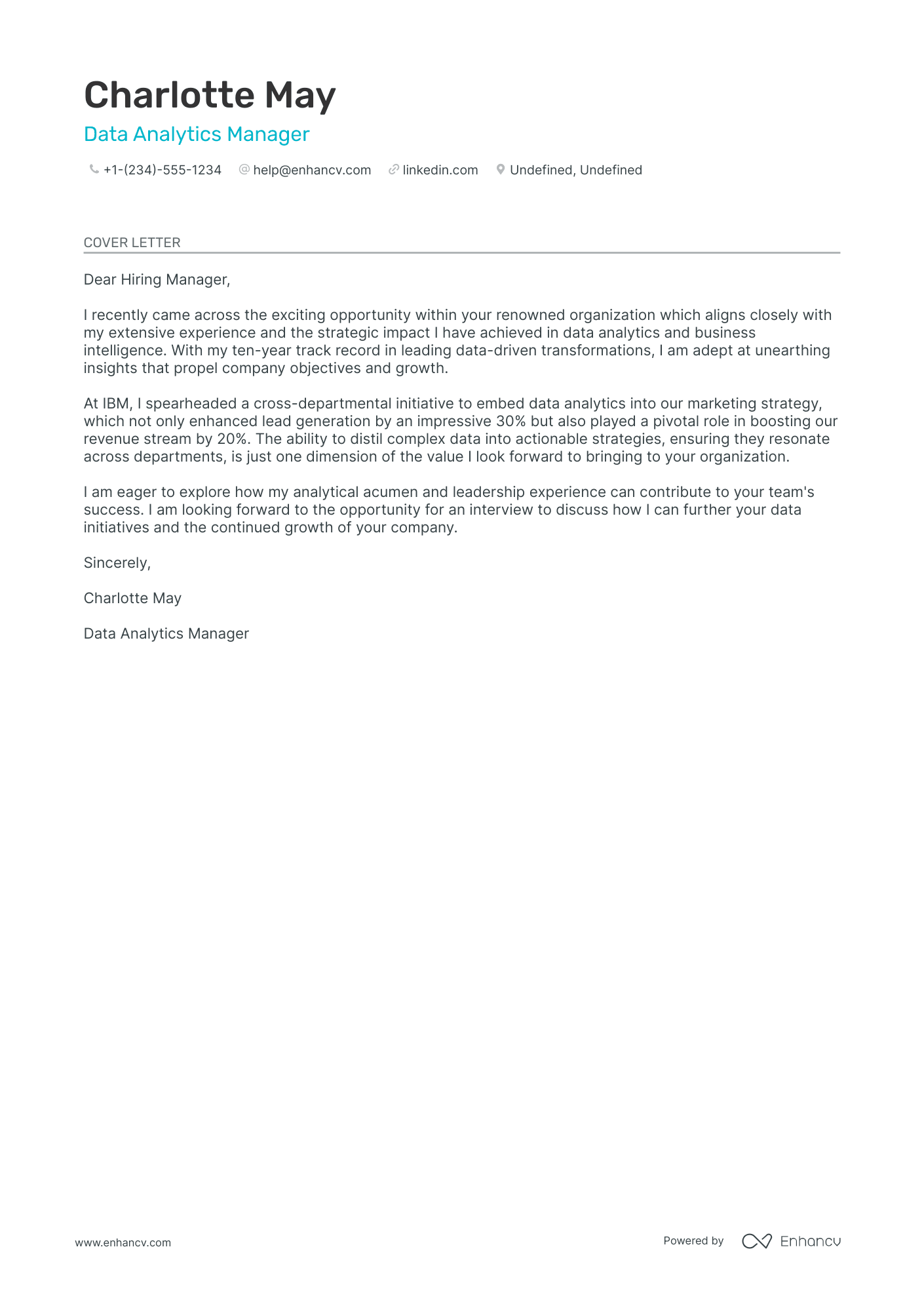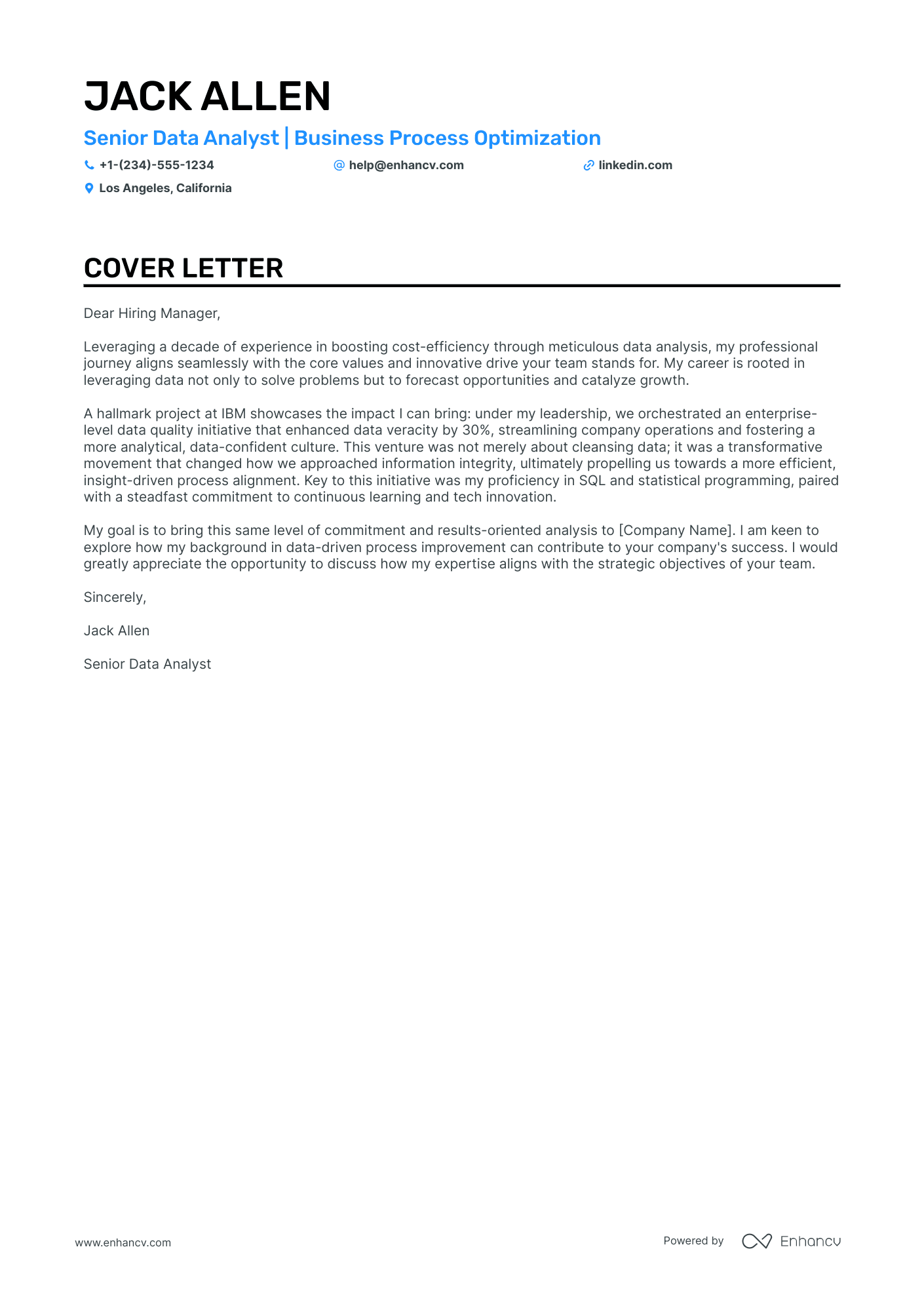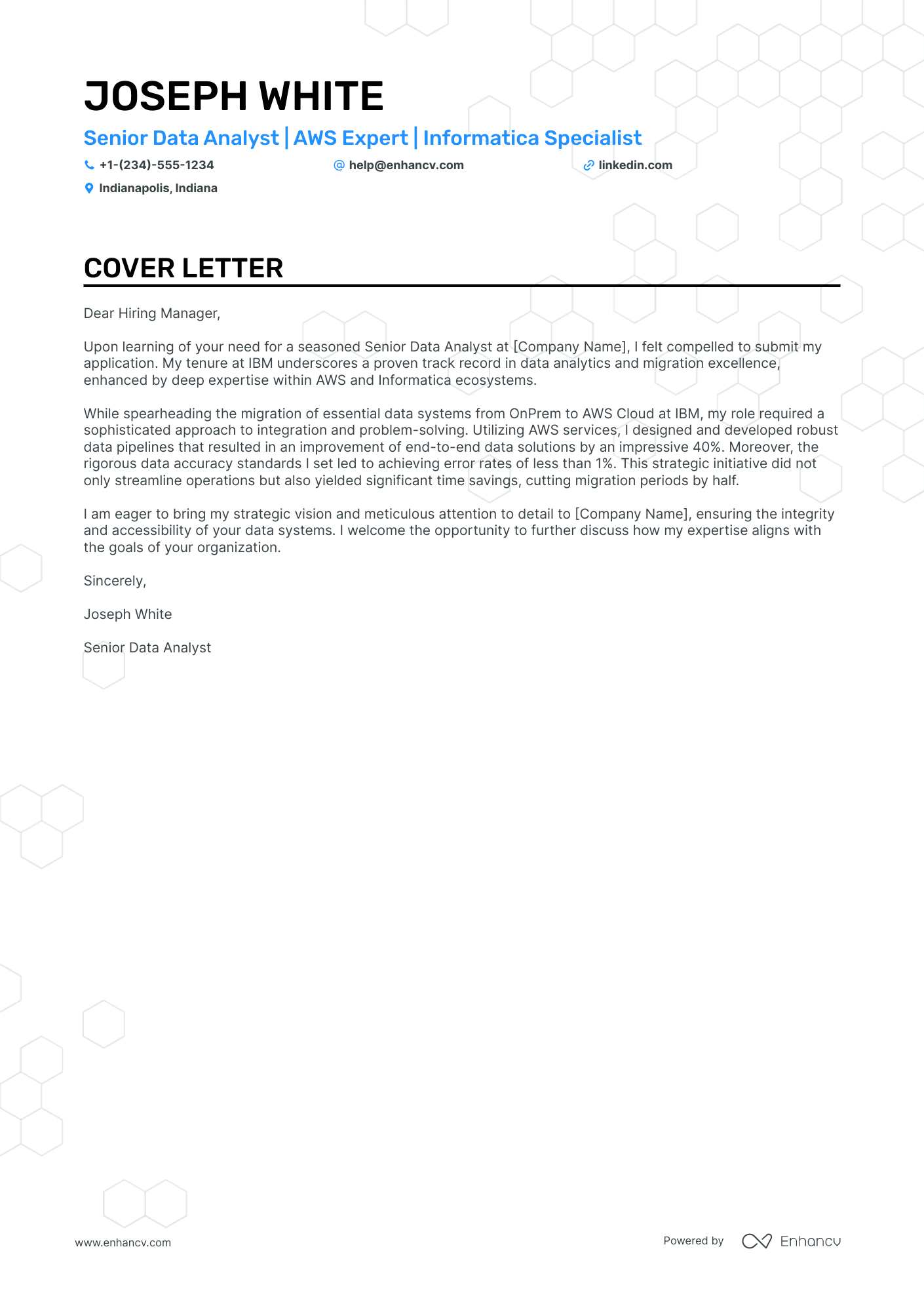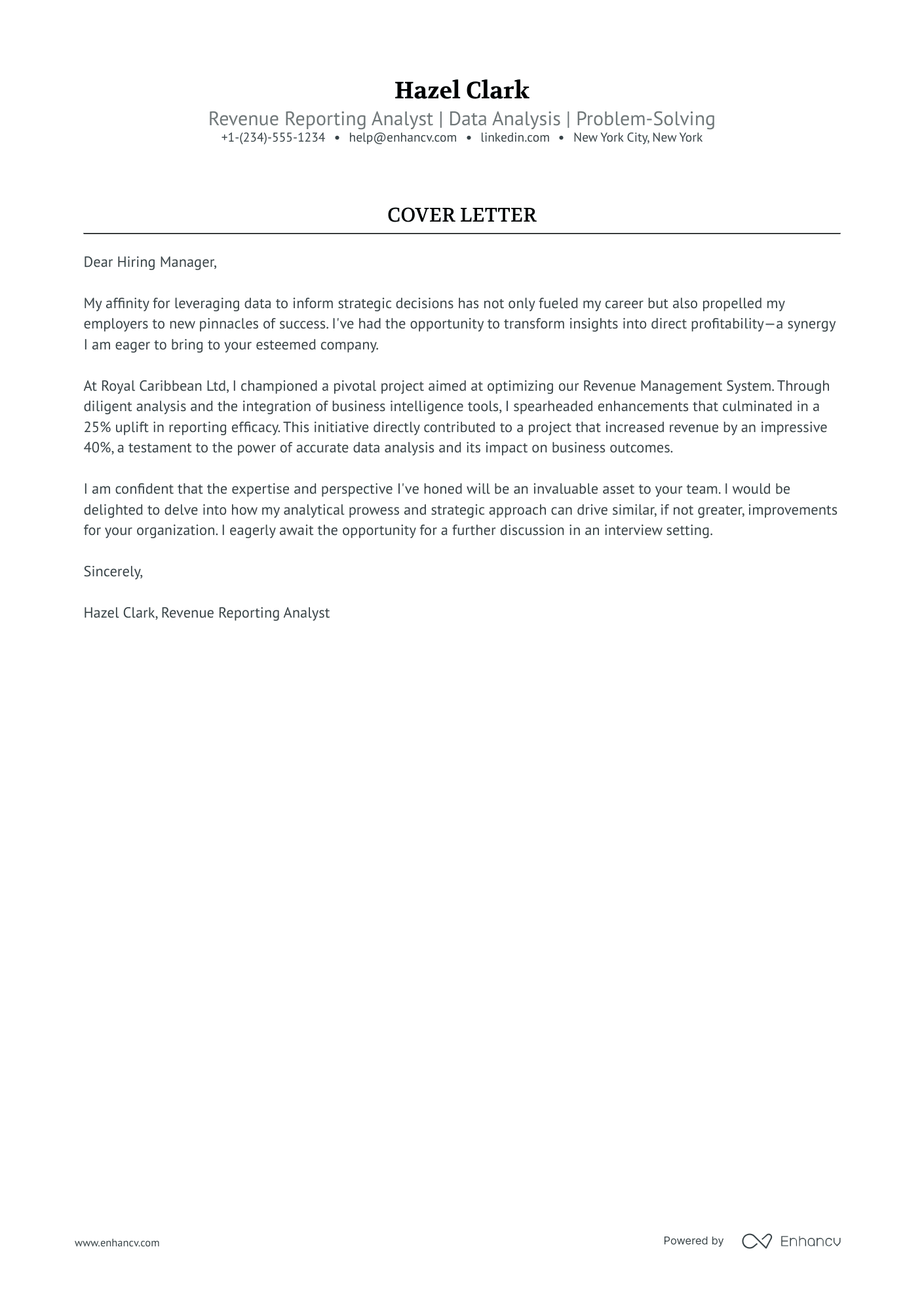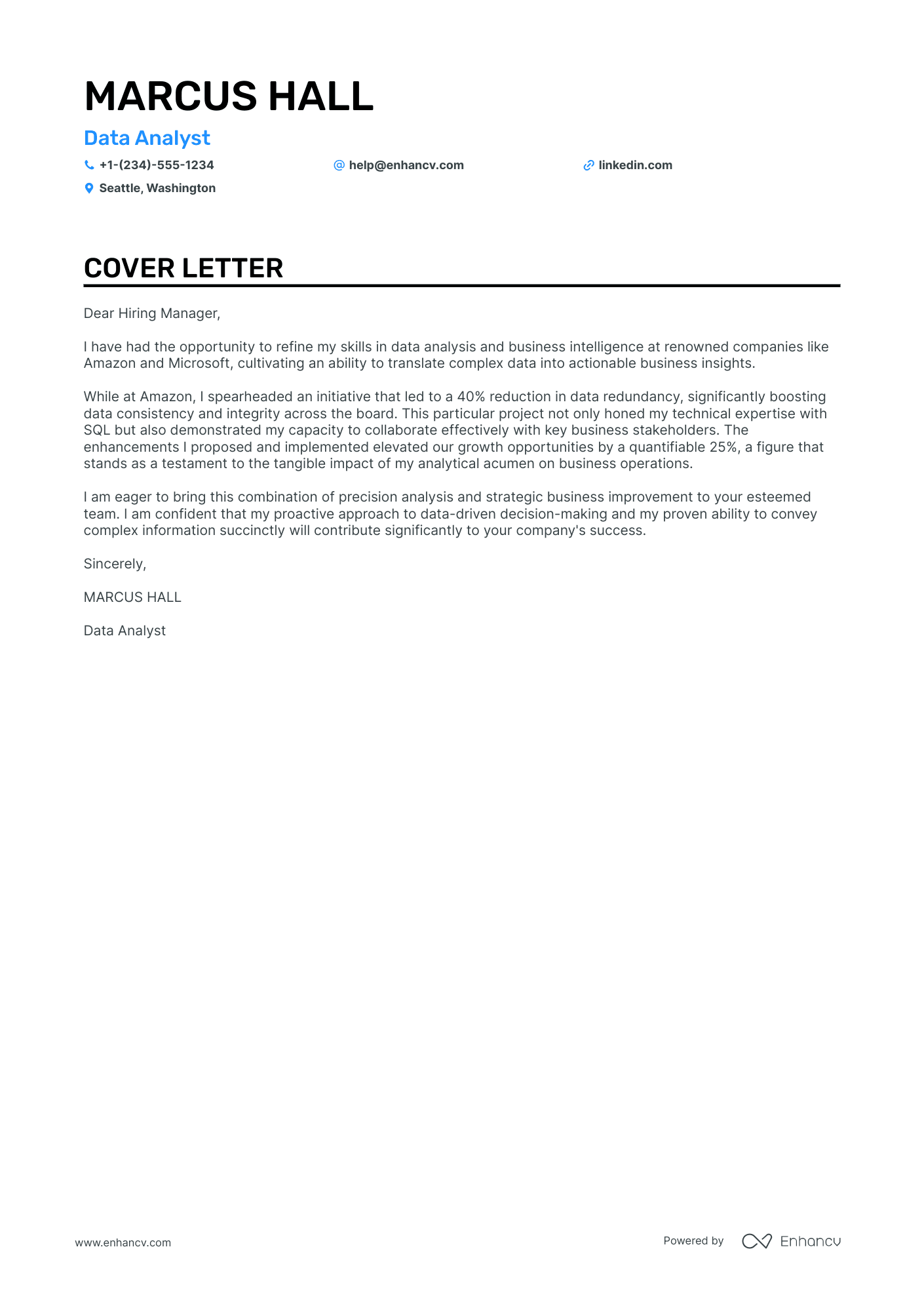As you dive into the job-hunting ocean, you've noticed that your application isn’t complete without a data analyst cover letter. Writing one can be tricky; it's not just an echo of your resume. It’s your chance to spotlight your proudest professional moment and weave it into a compelling narrative. The key is to keep it concise, steer clear of tired phrases, and maintain a formal yet engaging tone. Remember, brevity is your ally – aim for a single compelling page.
- Create a data analyst cover letter to persuade the recruiters you're the best candidate for the role;
- Use industry-leading data analyst cover letter templates and examples to save time;
- Dedicate your data analyst cover letter space to your best achievement;
- Make sure your data analyst cover letter meets recruiters' expectations and standards.
Avoid starting at the blank page for hours by using Enhancv's AI - just upload your resume and your data analyst cover letter will be ready for you to (tweak and) submit for your dream job.
If the data analyst isn't exactly the one you're looking for we have a plethora of cover letter examples for jobs like this one:
- Data Analyst resume guide and example
- Data Specialist cover letter example
- SQL Data Analyst cover letter example
- Data Analytics Manager cover letter example
- Azure Data Engineer cover letter example
- Data Entry Operator cover letter example
- Excel Data Analyst cover letter example
- Senior Data Scientist cover letter example
- Data Entry Clerk cover letter example
- AWS Data Engineer cover letter example
- Data Center Engineer cover letter example
Drop your resume here or choose a file.
PDF & DOCX only. Max 2MB file size.
Data analyst cover letter example
PAYTON WEBSTER
The Hague, Netherlands
+1-(234)-555-1234
help@enhancv.com
- Emphasizing relevant work experience and significant achievements, such as the development of a hybrid context-based music recommender system, directly showcases the candidate's expertise and successful project outcomes.
- Highlighting the alignment of personal passion with the role's requirements, in this case, a passion for music discovery, helps to frame the candidate as a motivated and engaged potential employee.
- Expressing appreciation and interest in the company culture, as well as explicitly stating the motivation to contribute to the team's success, demonstrates the candidate's research into the company and genuine interest in the role.
- Offering to discuss how their background, skills, and interests align with the company's goals in an interview suggests a proactive approach and readiness to engage in further conversations about the candidate's fit for the team.
What are the basics of the design or format of your data analyst cover letter?
To start, here's a reminder for you: the Applicant Tracker System (or software that is used to assess candidate profiles), won't be reading your data analyst cover letter.
Recruiters enjoy reading data analyst cover letters with a standardized format that uses:
- the same font as the resume (e.g. modern ones like Raleway or Volkhov are prefered over the clichéd Times New Roman or Arial);
- single spacing to keep the content concise and organized (this is all ready for you in our cover letter templates);
- a one-inch margin to wrap around the text, like in our cover letter builder;
- PDF as a file format, as it allows your design (and visual element) to stay the same.
Finally, we can't go on without mentioning the key sections of your data analyst cover letter.
In the top one-third, make sure to include a header (with your contact information, name, role, and date), a salutation, and an introduction.
Next, follows the heart and soul of your data analyst cover letter or its body.
End your data analyst cover letter with a closing paragraph and, if you wish, a signature.
Cut down the time spent on cover letters. Use our free cover letter generator to create one in seconds.
The top sections on a data analyst cover letter
- Header: This should contain the applicant's contact information, date, and the employer's details, establishing a professional tone and providing easy reference for the recruiter.
- Greeting: Address the hiring manager by name if possible to personalize the cover letter and show attention to detail, which is crucial for a data analyst role.
- Introduction: Begin with a strong opening that highlights your relevant experience or a notable achievement in data analysis to catch the recruiter's attention and emphasize your suitability for the position.
- Body: Include specific examples of data projects, tools you are proficient in (like SQL, Python, or R), and quantitative achievements that illustrate your analytical skills and ability to derive insights from data, reflecting core responsibilities of a data analyst.
- Closing: Conclude by expressing your enthusiasm for the opportunity to contribute to the company's data-driven goals, along with a call to action inviting the recruiter to discuss your application further, demonstrating proactivity and communication skills.
Key qualities recruiters search for in a candidate’s cover letter
- Proficiency in data analysis software and tools (such as SQL, Excel, R, or Python): Vital for analyzing large datasets efficiently and effectively.
- Strong analytical and critical thinking skills: Necessary to interpret complex data and draw accurate conclusions to inform business decisions.
- Experience with data visualization and reporting: Helps in communicating findings clearly to stakeholders through tools like Tableau or Power BI.
- Attention to detail: Ensures accuracy and reliability of data analysis, which is crucial for making informed decisions.
- Knowledge of statistical methods and data mining techniques: Allows for more sophisticated analysis and the ability to uncover hidden insights.
- Understanding of the industry: Familiarity with the specific sector the company operates in enables more relevant and contextual data interpretation.
Kick off your data analyst cover letter: the salutation or greeting
When writing your data analyst cover letter, remember that you're not writing for some complex AI or robot, but for actual human beings.
And recruiters, while on the lookout to understand your experience, would enjoy seeing a cover letter that is tailored to the role and addresses them. Personally.
So, if you haven't done so, invest some time in finding out who's the hiring manager for the role you're applying to. A good place to start would be LinkedIn and the corporate website.
Alternatively, you could also get in touch with the company to find out more information about the role and the name of the recruiter.
If you haven't met the hiring manager, yet, your data analyst cover letter salutation should be on a last-name basis (e.g. "Dear Mr. Donaldson" or "Dear Ms. Estephan").
A good old, "Dear HR Professional" (or something along those lines) could work as your last resort if you're struggling to find out the recruiter's name.
List of salutations you can use
- Dear Hiring Manager,
- Dear [Company Name] Team,
- Dear [Mr./Ms./Dr.] [Last Name],
- Dear [Department] Department,
- Dear Search Committee,
- Dear Talent Acquisition Team,
The data analyst cover letter intro: aligning your interest with the company culture
You only have one chance at making a memorable first impression on recruiters with your data analyst cover letter.
Structure your introduction to be precise and to include no more than two sentences.
Here are some ideas on how to write a job-winning data analyst cover letter introduction:
- get creative - show off your personality from the get-go (if this aligns with the company culture);
- focus on your motivation - be specific when you say what gets you excited about this opportunity.
What to write in the middle or body of your data analyst cover letter
Here's where it gets tricky.
Your data analyst cover letter body should present you in the best light possible and, at the same time, differ from your resume.
Don't be stuck in making up new things or copy-pasting from your resume. Instead, select just one achievement from your experience.
Use it to succinctly tell a story of the job-crucial skills and knowledge this taught you.
Your data analyst cover letter is the magic card you need to further show how any organization or team would benefit from working with you.
Ending your data analyst cover letter to avoid "sincerely yours"
Yes, this sort of closing statement may work best before your signature.
But you want to give recruiters something more with your data analyst cover letter ending.
Some professionals choose to go down the path of promises. In a single sentence, they map out what they'd bring about to the role (whether that's a particular technical skill set or personal traits).
Others, decide to be more concrete by thanking recruiters for their time and prompting for their next interview.
Whatever path you choose, remember to always be polite and respectful of the opportunity you've had. Good manners go a long way .
Is it beneficial to mention that you have no experience in your data analyst cover letter?
Lacking professional experience isn't the end of the world for your data analyst cover letter.
Just be honest that you may not have had roles in the industry, but bring about so much more.
Like, your transferable skills, attained thanks to your whole work and life experience (e.g. the skills your summer spent working abroad taught you).
Or, focus on what makes you, you, and that one past success that can help you stand out and impress recruiters (think of awards you've attained and how they've helped you become a better professional).
Alternatively, write about your passion and drive to land the job and the unique skill set you would bring to enhance the workplace culture.
Key takeaways
Within this Enhancv guide, we've provided you with plenty of advice and inspiration on writing your data analyst cover letter:
- Always make sure your data analyst cover letter is tailored to the role you're applying for to make a good impression on recruiters;
- In your data analyst cover letter include a header (with your name, the role you're applying for, date, and contact details) and an introduction of up to two sentences that highlight your key accomplishment or why you'd fit the role;
- Focus your data analyst cover letter body on one sole achievement through your career and all the valuable lessons, skills, and know-how you've learned (that are relevant to the role);
- Ensure your data analyst cover letter closing statement isn't generic and includes either a call to action or a promise;
- If you lack professional experience, shift recruiters' focus to a relevant achievement (thanks to your academic or versatile experience) or toward your dreams and goals for professional growth.
Data Analyst cover letter examples
By Experience
Data Analyst Intern
Senior Insurance Data Analyst
Entry-Level Risk Adjustment Data Analyst
By Role
